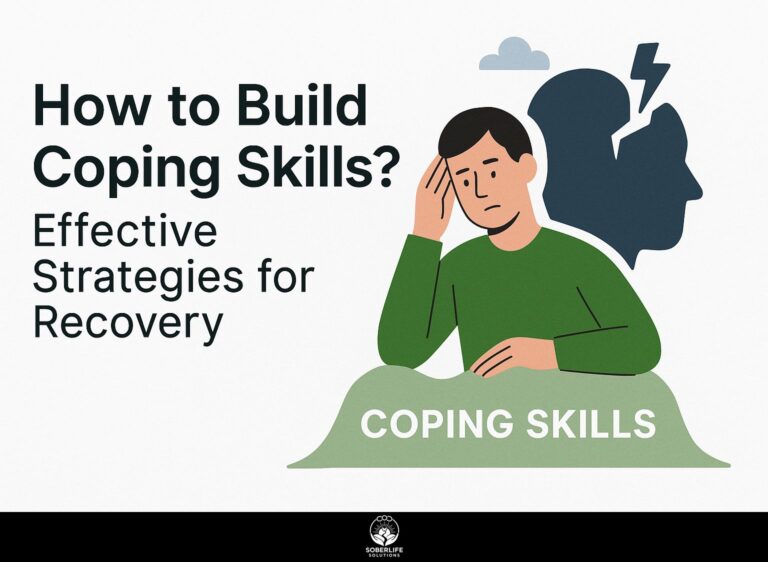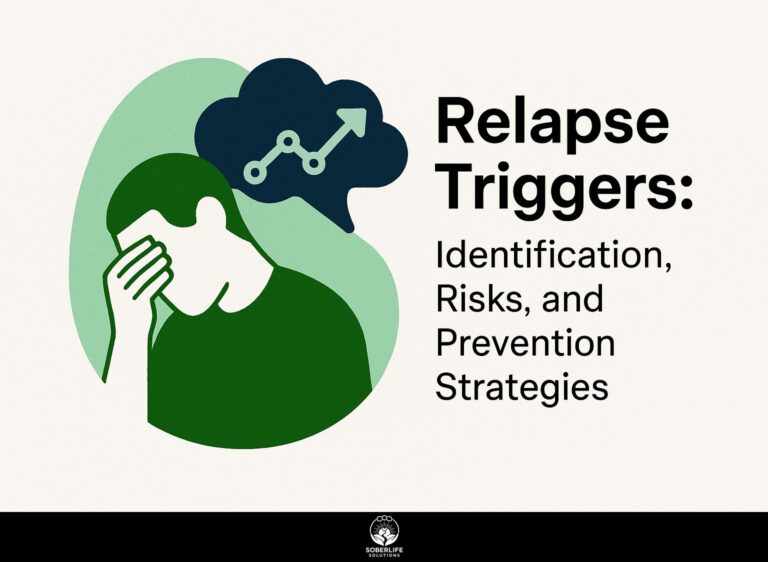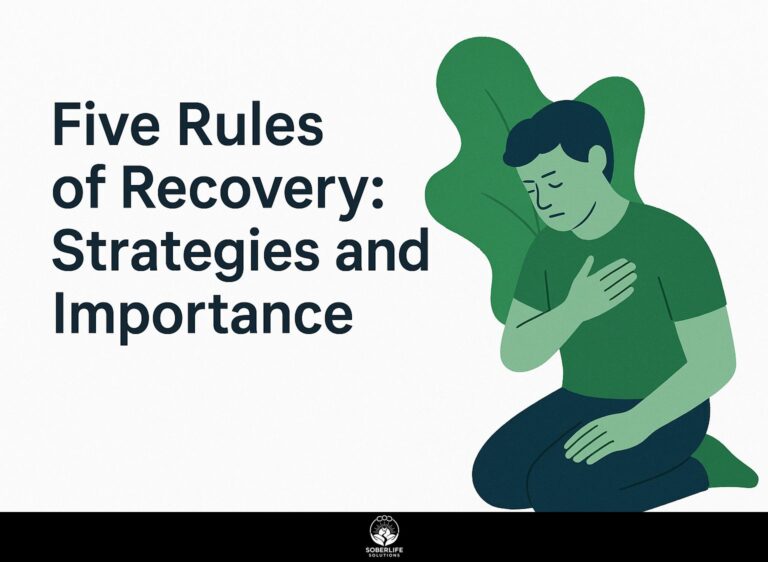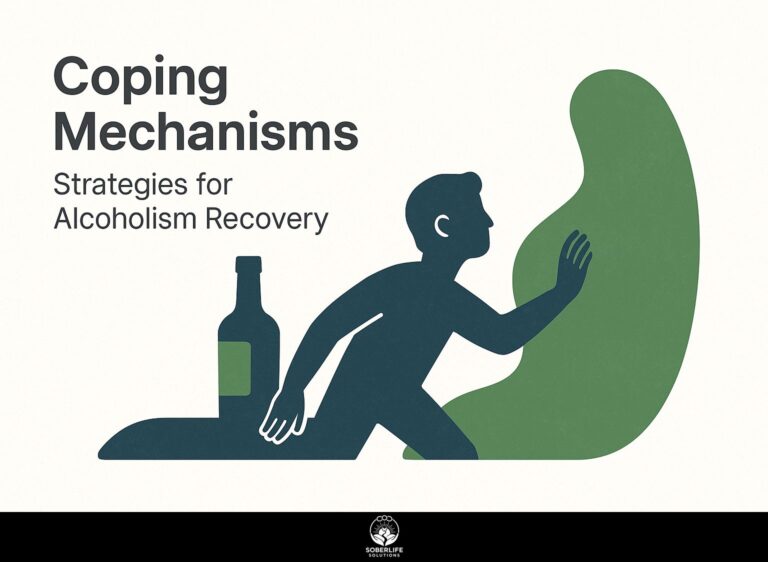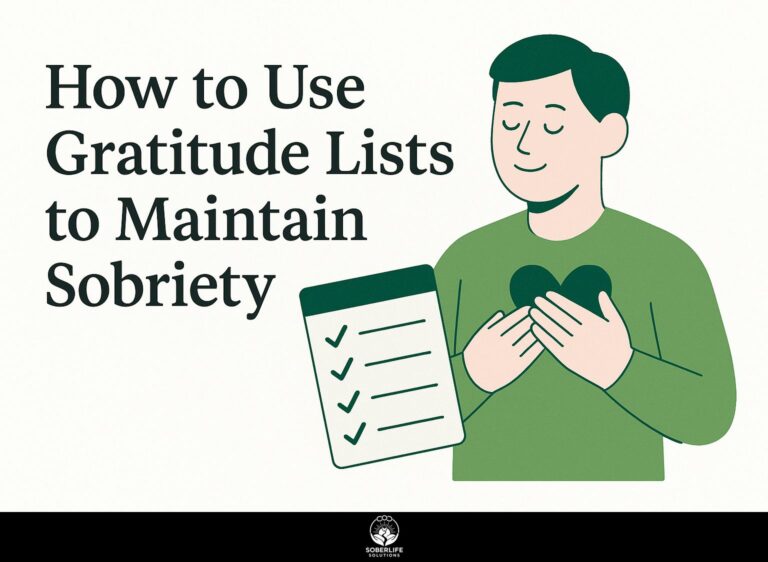How to Stay Busy: Activities to Prevent Relapse
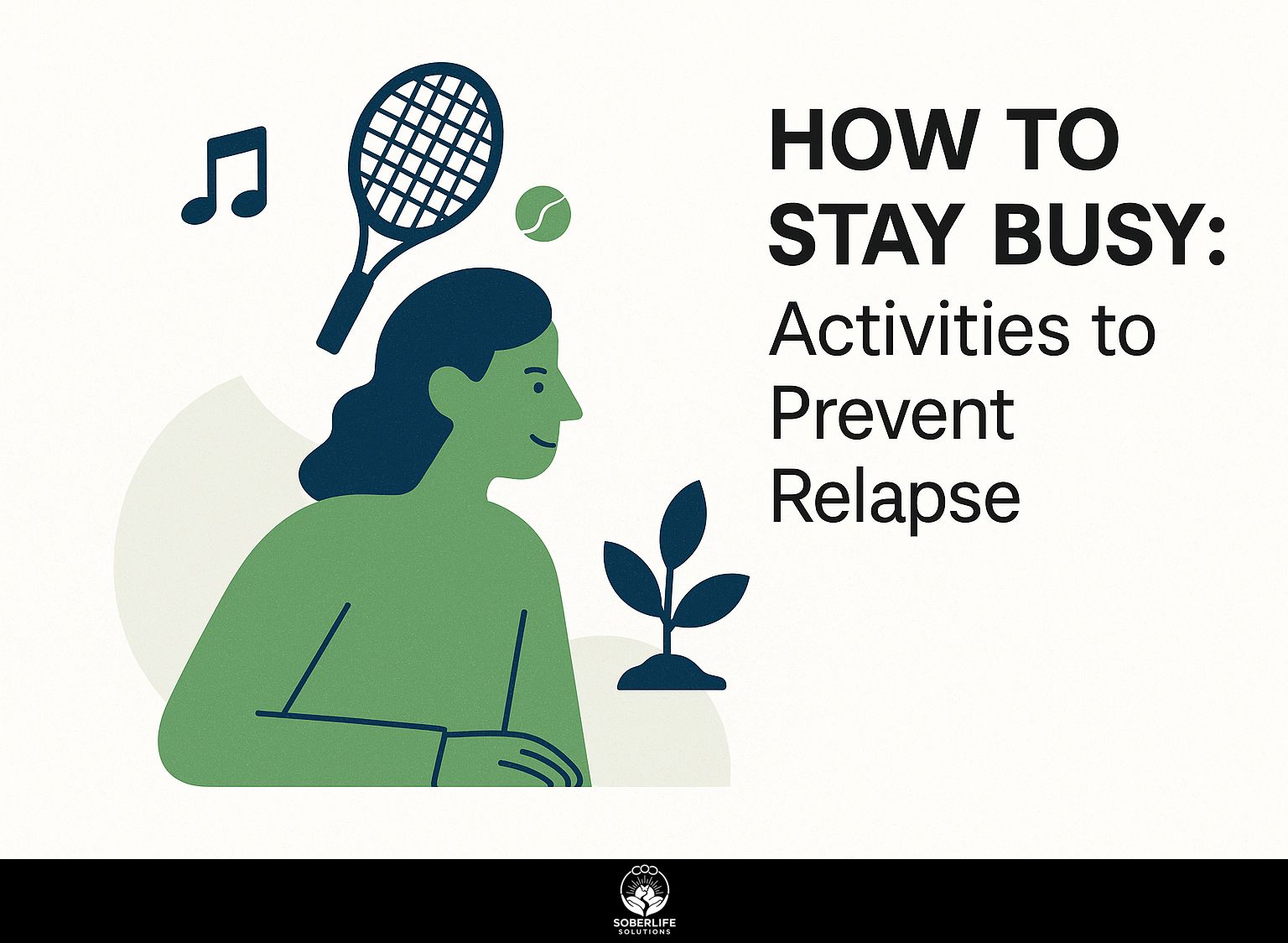
Keeping occupied is important in avoiding relapse during addiction recovery. Being bored can often lead to using substances. It’s important to have interesting things to do nearby. According to research from NCBI and resources from SAMHSA, filling your time with constructive tasks can help maintain access to healthier choices. In this article, we’ll look at different activities meant to keep you busy, help with your recovery, and lower the chance of relapse.
Key Takeaways:
The Importance of Staying Busy
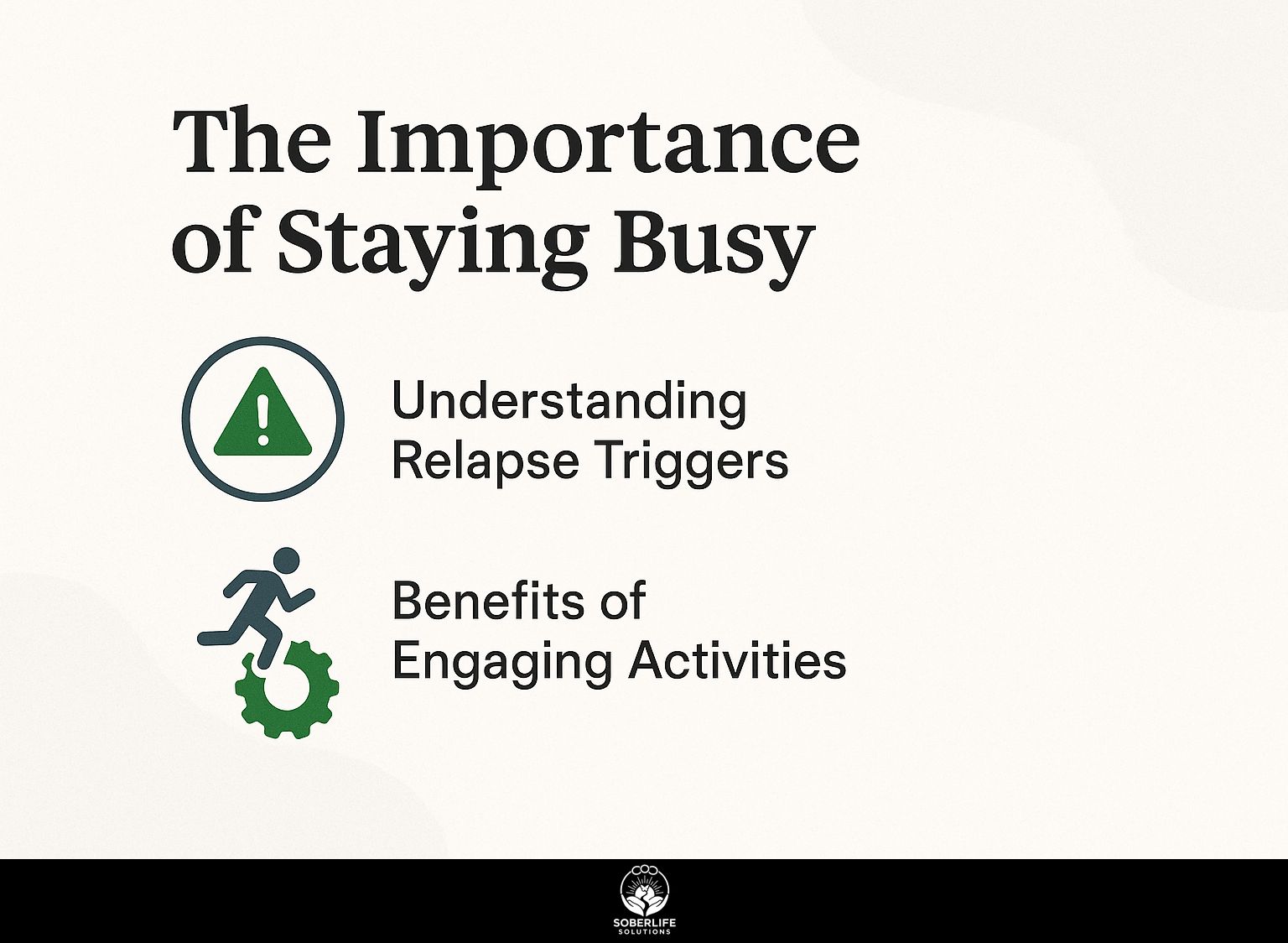
Keeping occupied helps people avoid situations that might cause a relapse and encourages them to build good habits to aid in their recovery. Worth exploring: How to build a workout habit – Sober Life Solutions
Understanding Relapse Triggers
Identifying personal triggers, such as social situations or emotional stress, is essential for effective relapse prevention strategies.
To manage these triggers effectively, start by keeping a daily journal to document emotions and situations that lead to cravings.
Tools like the SAMHSA’s National Helpline can connect you with counseling services. For those interested in a broader approach, the Whole Health Library offers comprehensive strategies for reducing relapse risk.
Identify coping mechanisms, such as deep breathing exercises or engaging in physical activity, when faced with triggers. For example, if socializing in a bar is a trigger, consider organizing alternative activities like a movie night with friends instead. As mentioned in our guide on creating a relapse prevention plan, proactive planning can significantly reduce your exposure to high-risk environments.
This proactive approach reduces your exposure to high-risk environments.
Benefits of Engaging Activities
Participating in activities supports emotional well-being and greatly lessens boredom and loneliness during recovery.
Keeping active during recovery provides many advantages. Being part of groups such as Alcoholics Anonymous improves social connections and builds community.
Pursuing hobbies such as painting or gardening can stimulate dopamine release, improving overall mood. In fact, research from Verywell Mind highlights how engaging in hobbies is beneficial for stress relief, further endorsing their importance for emotional health.
For example, Sarah, who previously struggled with addiction, found comfort in pottery classes. These classes kept her busy and allowed her to make new friends. This method for recovery helps people maintain emotional balance and gives them practical ways to handle challenges.
Physical Activities
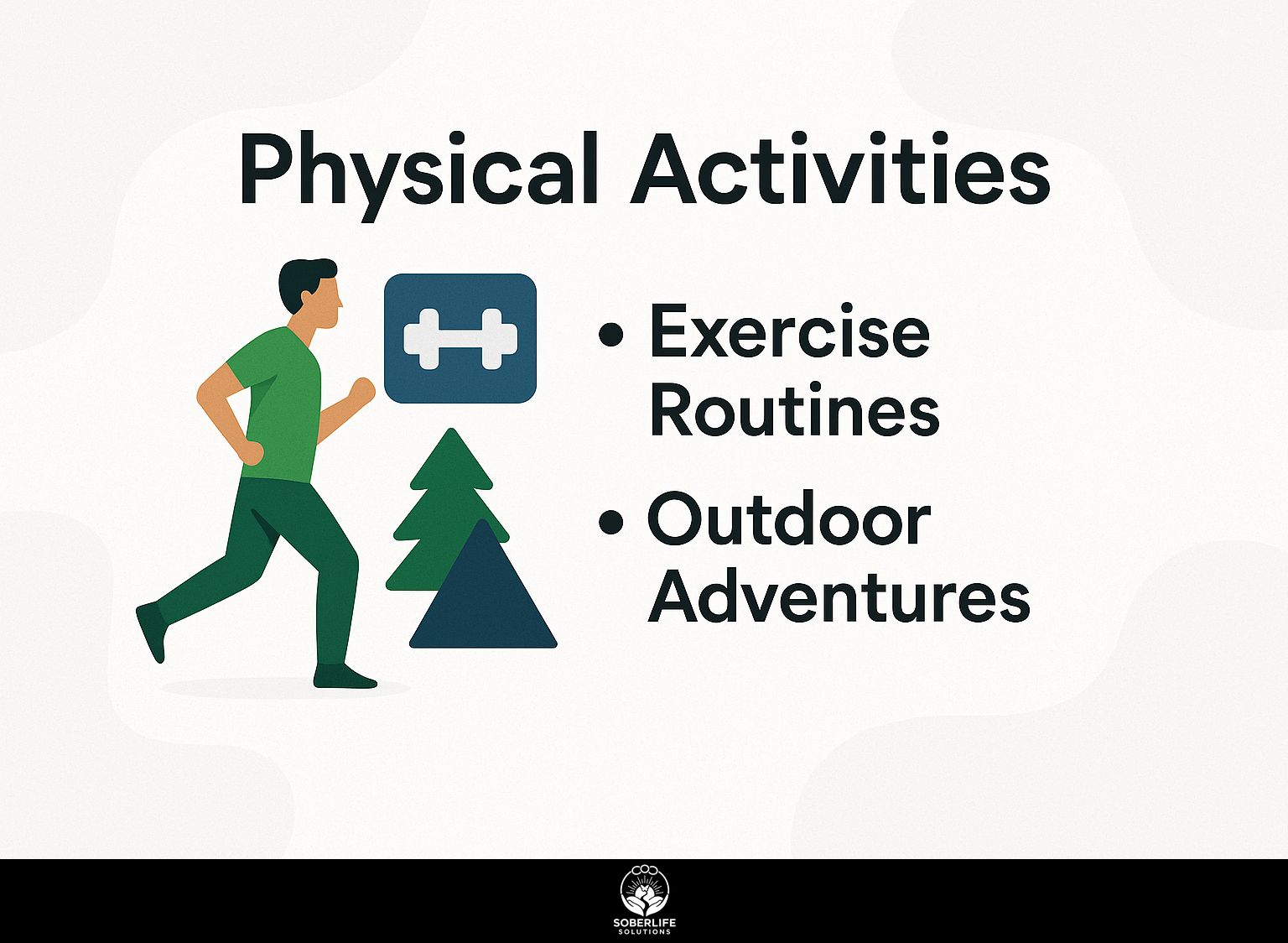
Exercise helps improve recovery and supports both the mind and body.
Exercise Routines
Implementing a structured exercise routine can effectively reduce cravings and promote overall well-being.
Start by dedicating at least 30 minutes to exercise, aiming for 3-5 days a week. Activities can include brisk walking, jogging, or strength training.
For effective tracking and progression, use tools like MyFitnessPal or Fitbit, which allow you to log workouts and monitor caloric intake.
Combine cardio workouts with strength exercises, such as bodyweight movements or using resistance bands, to improve muscle tone and increase metabolism. Gradually increase intensity as you become more comfortable, which can also help curb cravings over time. This approach is supported by findings from ScienceDirect, which discusses the role of physical activity in managing cravings during substance use treatment.
Outdoor Adventures
Spending time outside doing activities can bring back excitement and focus, which are important for staying sober.
Doing activities such as hiking, biking, or being part of local sports teams can greatly improve your social circle and general health.
Consider joining a Meetup group focused on hiking or mountain biking; this platform is ideal for finding local enthusiasts who share your interests. You could look into community centers that have sports leagues or outdoor activities.
A lot of parks offer weekly group runs or fitness classes, creating a friendly setting where people can meet and maintain a healthy, active way of living.
Creative Outlets
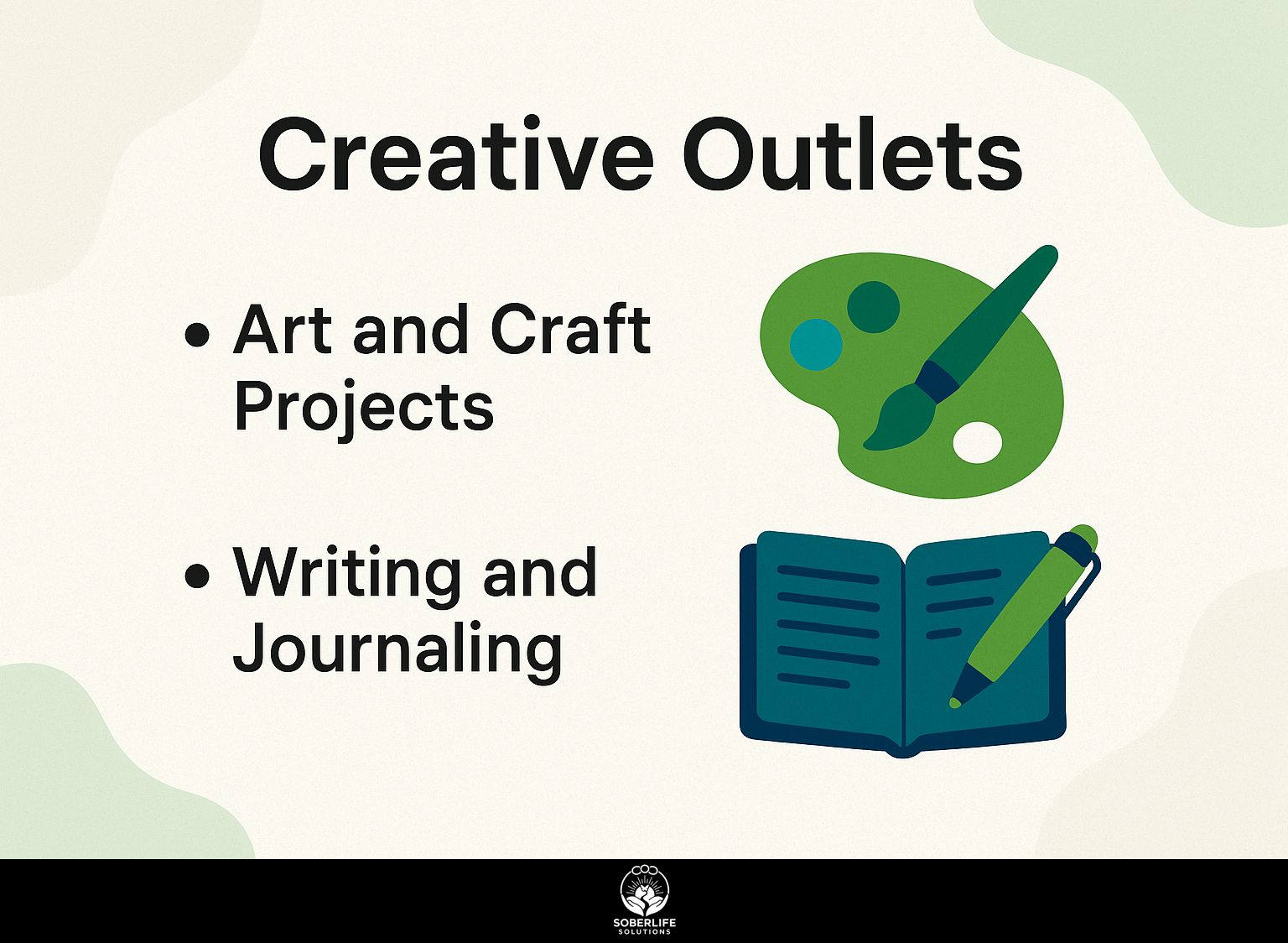
Creative activities offer a calming way for people to show their feelings and handle stress well. For those in recovery, these activities can serve as positive distractions, helping manage urges and emotions effectively.
Art and Craft Projects
Creating art and craft projects lets you express emotions and provides a feeling of success.
Consider trying out specific projects like painting, knitting, or pottery. For example, painting lets you try out different colors and shapes, which can help you relax.
Websites like Skillshare provide organized online courses for beginners, while YouTube has plenty of free tutorials.
Knitting makes warm fabrics and the repeated movements can be calming. Pottery, on the other hand, allows for tactile engagement, which is also soothing.
Each project provides specific therapeutic benefits, helping to lower stress and increase mindfulness in daily life.
Writing and Journaling
Writing and journaling are effective ways to reflect, understand feelings, and monitor progress during recovery.
To start a journaling practice, choose a platform that suits your style. Apps such as Day One Journal or Journey offer practical tips and methods to sort notes, while paper notebooks offer a unique feel.
Begin with simple questions like `What am I grateful for today?’ or `How did I deal with a challenge this week?’ This helps express your emotions and development.
Schedule 10-15 minutes daily to write; consistency is key. Over time, this method can help you become more aware of yourself and emotionally stronger, allowing you to see your progress more clearly.
Social Activities
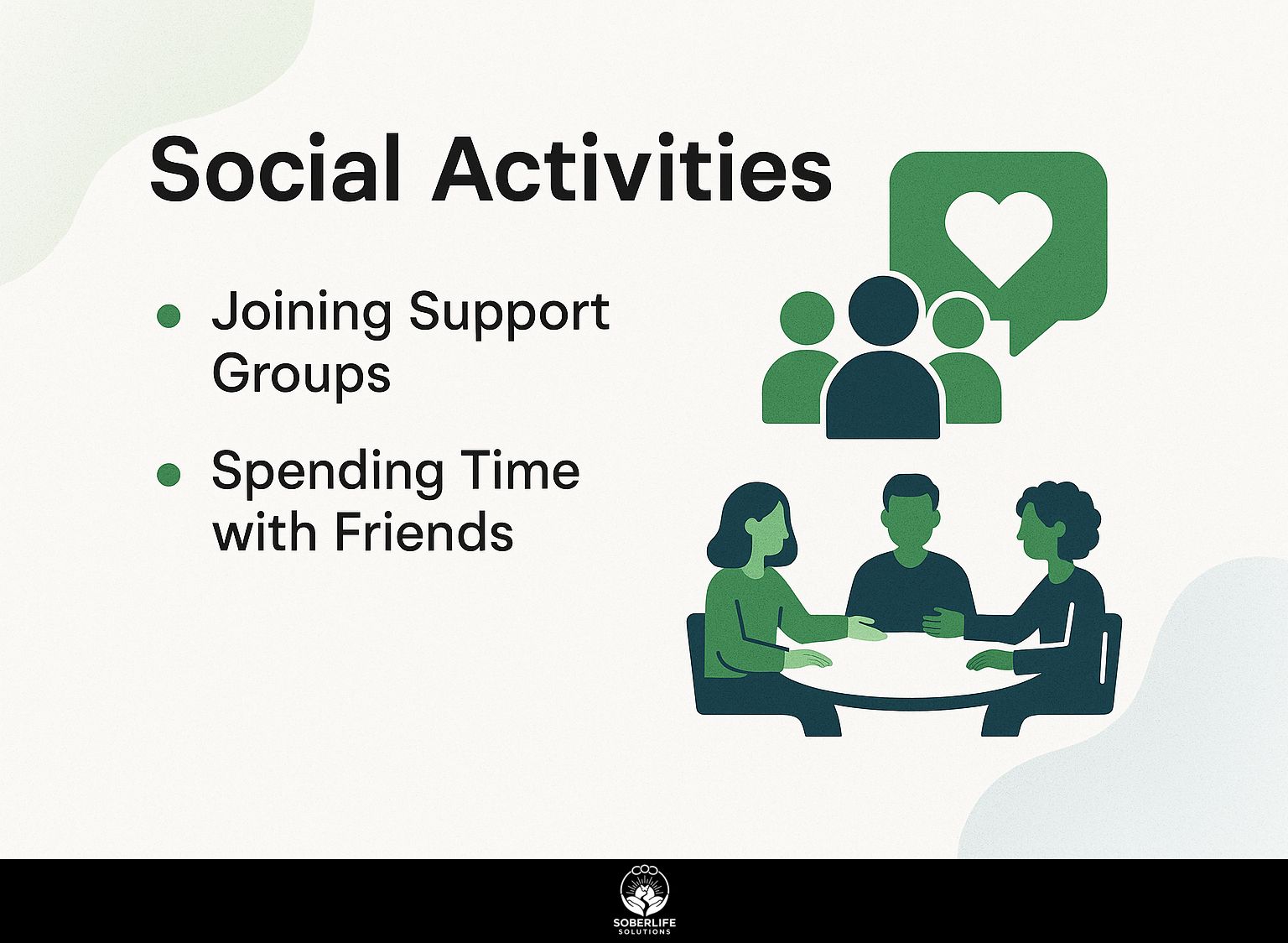
Social activities are important in recovery by helping people build relationships and get support from others who have experienced similar situations.
Joining Support Groups
Participating in support groups like Alcoholics Anonymous (AA) or Narcotics Anonymous (NA) offers important peer support and shared experiences.
To find support groups, start by searching local resources such as community centers or healthcare providers, which often list meetings.
Websites like AA.org and NA.org feature meeting locators for both in-person and online gatherings.
Consider joining forums or social media groups dedicated to recovery; these can provide support and accountability outside traditional meetings. Connecting with others facing similar issues creates a feeling of community and increases dedication to recovery, helping you heal.
Spending Time with Friends
Spending time with supportive friends can greatly help recovery by offering emotional support and reducing loneliness.
Engaging in regular activities with friends can fortify these bonds. Schedule weekly meet-ups, whether it’s for coffee, hiking, or attending a local event together.
Joining group activities such as yoga or art strengthens a sense of belonging and makes sure all are involved. Maintaining communication through texts or calls can keep support constant.
Research shows that individuals with strong social networks experience better recovery outcomes; for instance, those who actively participate in group activities report lower stress levels. Focus on these relationships because they are important for your path to recovery.
Mindfulness and Relaxation
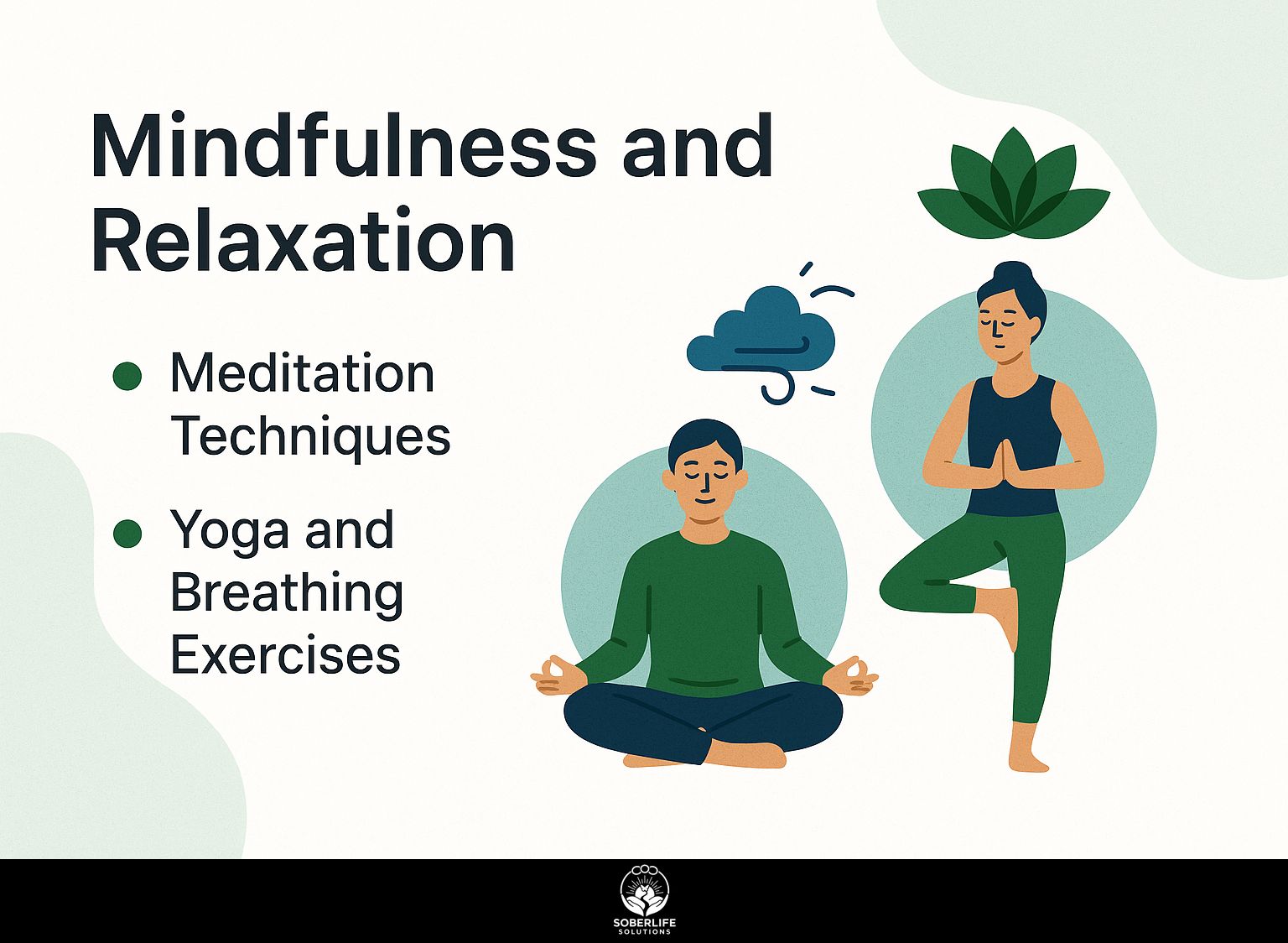
Adding mindfulness and relaxation methods to daily routines can greatly lower stress and emotional reactions during recovery. For those eager to delve deeper into these practices, we offer a direct contextual exploration of mindfulness and meditation techniques and their benefits in addiction recovery.
Meditation Techniques
Simple meditation techniques can help people become calm and focused, which are important for handling recovery challenges.
To start meditating, find a quiet space where you won’t be disturbed. Begin with just 5-10 minutes a day, focusing on your breath.
- Inhale deeply through your nose, hold for a few seconds, then exhale slowly through your mouth.
- As thoughts arise, gently acknowledge them without judgment and return your focus to your breath.
Try apps like Headspace or Calm. They provide guided sessions and alerts to help you stay focused.
Slowly extend the time you meditate to improve your practice and increase your mindfulness.
Yoga and Breathing Exercises
Yoga and controlled breathing exercises provide overall benefits, improving both physical health and mental clarity.
Practicing restorative yoga poses such as Child’s Pose and Legs-Up-the-Wall can help release tension and promote relaxation.
Combining these with deep breathing exercises such as the 4-7-8 method increases their benefits-breathe in for four counts, hold for seven, and exhale for eight.
People new to yoga can check out Yoga with Adriene on YouTube. The channel offers sessions focused on recovery and is simple for everyone to use.
Try to practice for 15-30 minutes each day to make it a routine. Focus on moving smoothly from one pose to the next to develop both strength and awareness.
Frequently Asked Questions
What are some activities to prevent relapse?
There are many different activities that can help prevent relapse, such as exercise, volunteering, hobbies, and therapy.
How can exercise help prevent relapse?
Exercise has many benefits for individuals in recovery, such as reducing stress and anxiety, improving mood, and promoting better sleep.
What are some good hobbies to keep busy and prevent relapse?
Some great hobbies to consider are painting, gardening, cooking, hiking, or playing a musical instrument. Find something that you enjoy and can easily do in your free time.
Why is volunteering a good way to stay busy and prevent relapse?
Helping others through volunteering can give you meaning and satisfaction, which is important for staying sober.
Can therapy be effective in preventing relapse?
Yes, therapy can help individuals identify triggers and develop coping strategies to prevent relapse. It also provides a safe space to discuss any challenges or struggles in recovery.
Are there any activities to avoid that may increase the risk of relapse?
It’s important to avoid activities that may trigger cravings or put you in situations where it may be difficult to resist using substances. This could include going to bars or parties where alcohol is present, or spending time with friends who still use drugs.

